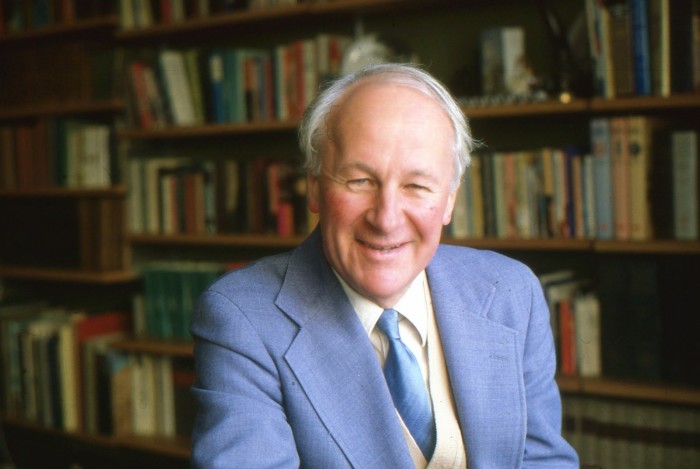I’ve said before that Between Two Worlds: The Challenges of Preaching Today by John Stott is one of the few masterpieces of homiletical instruction. If you haven’t ready it you really should stop reading what I’m about to say and buy a copy. But, should you tarry longer here, I hope you get a glimpse of why you the book is so valuable.
Where It All Begins
John Stott’s Between Two Worlds is borne out of the conviction preaching is “an indispensable necessity” for the church’s evangelism and growth (9). He understands the market for publications on the topic of preaching is saturated, but his aim is to fill a void any student of preaching can acknowledge to exist. Namely, his aim it “to bring together several complementary aspects of the topic, which have often been taken apart” (9). Thus, he weaves together historical, theological, and practical perspectives on preaching.
 His section on the history of preaching spans the centuries from Jesus to the twentieth century. Attention is then turned toward contemporary objections to preaching which include everything from the “anti-authority mood” to the influence of television. In part three Stott unfolds five foundations necessary for preaching the Word. The rest of the book, nearly two hundred pages worth, is occupied with practical considerations for preachers and their preaching. Stott spends an entire chapter encouraging pastors to diligent study of the word before he offers a method for preparing sermons. The final two chapters seek an appropriate balance in applying “sincerity and earnestness,” as well as “courage and humility” in delivery.
His section on the history of preaching spans the centuries from Jesus to the twentieth century. Attention is then turned toward contemporary objections to preaching which include everything from the “anti-authority mood” to the influence of television. In part three Stott unfolds five foundations necessary for preaching the Word. The rest of the book, nearly two hundred pages worth, is occupied with practical considerations for preachers and their preaching. Stott spends an entire chapter encouraging pastors to diligent study of the word before he offers a method for preparing sermons. The final two chapters seek an appropriate balance in applying “sincerity and earnestness,” as well as “courage and humility” in delivery.
That Between Two Worlds is still read thirty years after it’s initial publication is a testament to it’s enduring legacy. A noticeable strength of the book is the breadth of material that Stott manages to address in a relatively small number of pages. He succeeds in his desire to bring together several complementary aspects of preaching that normally have been kept apart (9). He boldly states in chapter one, “Preaching is indispensable to Christianity. Without preaching a necessary part of it’s authenticity has been lost. For Christianity is, in its very essence, a religion of the Word of God” (15). And what did all God’s preachers say? “Preach!”
Historical Precedent
To show preaching’s indispensability and uniqueness to the faith Stott first surveys the testimony of history and of Scripture. One might quibble about why the author deals with history before Scripture, but the quibbling really is for those who might be called “nitpickers.” Stott adequately shows that every century in the church’s history believed preaching to be a central focus in the church’s witness. What’s impressive about Stott’s survey is that he doesn’t succumb to a common temptation to root preaching’s history in the Reformation. Surely, the Reformation represented a recovery of the Word’s sufficiency—and thus a recovery of preaching—but we must give credit where credit is due. Mighty preachers are found in many places before the Reformation. Stott recognizes this and gives due attention to the church fathers, friars, and 19th century giants such as Simeon and Alexander. However, Spurgeon is noticeably absent from Stott’s discussion on this period, an unfortunate oversight for sure. Maybe it’s my Baptist bias, but surely the “Prince of Preachers” deserves mention in any history of preaching—especially from a fellow Englishman!
A practical implication for preachers today is quite simple on this point: study church history. “Chronological snobbery” will stagnate one’s ministerial development, especially one’s homiletical development. Historical awareness protects the pastor from undue thoughts of novelty, while also providing encouraging example from the giants of old. Stott clearly knows his history and is better off for it.
“Dialogical Preaching,” Really?
The second chapter finds Stott dealing with contemporary objections to preaching and of particular help is his discussion on the “anti-authority mood” (51-64). Stott gives five points today’s preachers must remember as they respond to modernity’s and post-modernity’s distaste of authority. He calls preachers to remember: 1) the nature of human beings in Christian understanding, 2) the doctrine of revelation, 3) the locus of authority, 4) the relevance of the gospel, and 5) the dialogical character of preaching. On this fifth and final point, we need not fear that Stott reveals himself to be a precursor of the dialogical preaching advocated in recent years by members of the emerging church. Instead, Stott wants preaching to contain a “silent dialogue” between preachers and their hearers. The preacher should be aware of potential pitfalls in the audience’s interpretation of or objections to a given text. Preachers today would do well to remember this reality.
In chapter three Stott gets down biblical business. What does the Bible have to say about preaching? He writes, “True Christian preaching is extremely rare in today’s Church . . . The major reason must be a lack of conviction about its importance” (92). The biblical remedy for this malady is a mixture of five convictions: a conviction about, 1) God, 2) Scripture, 3) the church, 4) the pastorate, and 5) preaching. We preachers must be reminded that preaching is fundamentally a theological reality, and this chapter will do precisely that.
Yes, Pick Up the Book—And Other Books
Another chapter worth particular mention is chapter five and “The Call to Study.” Much of today’s evangelicalism is saturated with cries that the pastor learn leadership techniques ripped from the corporate sector. Leadership is indeed a fundamental part of the pastor’s work, but we must ask, “How does the pastor lead?” I would argue, “The pastor primarily leads through the preaching of God’s word.” Stott seems to agree, for he says, “Since the pastor is primarily called to the ministry of the Word, the study of Scripture is one of his foremost responsibilities” (181). Further, “The higher our view of the Bible, the more painstaking and conscientious our study of it should be” (182). To selectively know Scripture and study it with irregularity is to fall into the devil’s hands and cause the congregation to starve of faithful shepherding.
An implication here relates to the preacher’s elders and congregation. If the church’s elders and members don’t their pastor’s leadership is primarily rooted in the proclamation of God’s word, the pastor inevitably will find everything but preaching and study consuming his time. Could the decline of real evangelicalism in America be linked to a decline of the church’s perception of preaching? It sure seems so. Stott issues a clarion call to pastors and churches to not only recover the importance of preaching, but to recover the diligent study of God’s word as being the necessary and fertile ground in which faithful proclamation can grow.
Balance, Always Balance
Finally, something must be said of Stott’s worthy articulation of balance in the preacher’s life and ministry. Of peculiar import here is his call for the pastor to be sincere and earnest, courageous and humble. The reality of indwelling sin means every pastor will tilt to one side of the biblical ideal. For example, preachers today can have so much courage in delivery that their preaching has a swagger—which really is the stench of pride. Stott rightly calls God’s men to be tough and tender. For Stott, this balance can be seen in the pastor’s willingness to both disturb and comfort his congregation in preaching. In my circles at least, the element of disturbance is often emphasized at the expense of comfort. Stott rightly calls preachers to a “humble mind (being submissive to the written Word of God), a humble ambition (desiring an encounter to take place between Christ and his people), and a humble dependence (relying on the power of the Holy Spirit)” (335).
Why You Should Read It
Preaching indeed is “indispensible to Christianity.” John Stott’s Between Two Worlds represents a veritable gold mine of instruction and application for preachers who desire to devote themselves to the ministry of God’s word. The book is useful not only to those just starting out in the ministry, but can serve as a welcome reminder to men who have a couple decades under there ministerial belt. Is it an overstatement to call this book “required reading?” Maybe. But I still think we should say it. Overstatement is good every once in a while.
Even though Stott’s roots were in the Anglican tree, here is a theology and practice of preaching that transcends denominational lines and convictions. Perhaps this is because preaching itself transcends denominational lines and convictions. For all these reasons and more, Between Two Worlds is a timely and timeless work.

